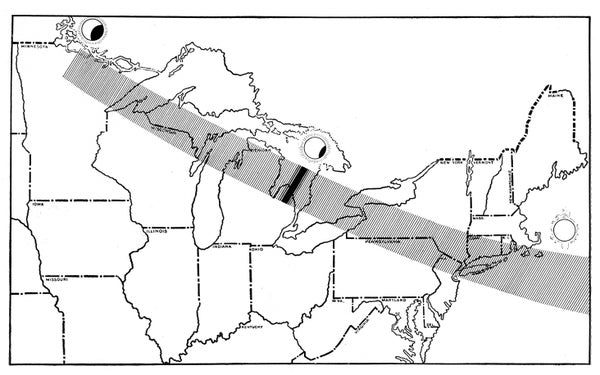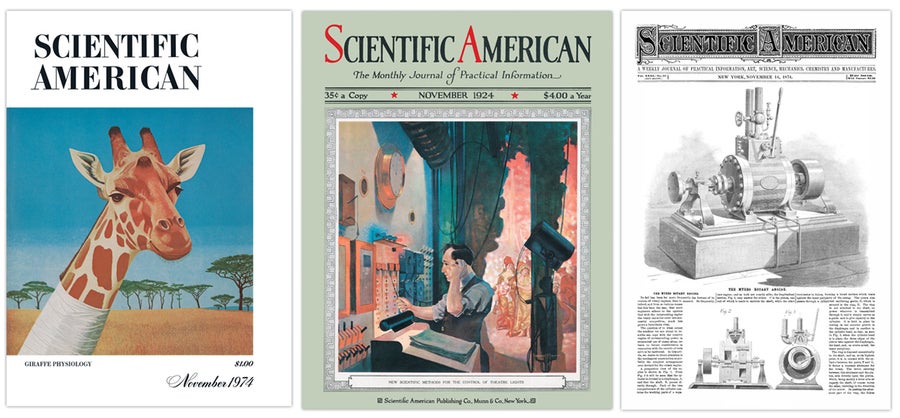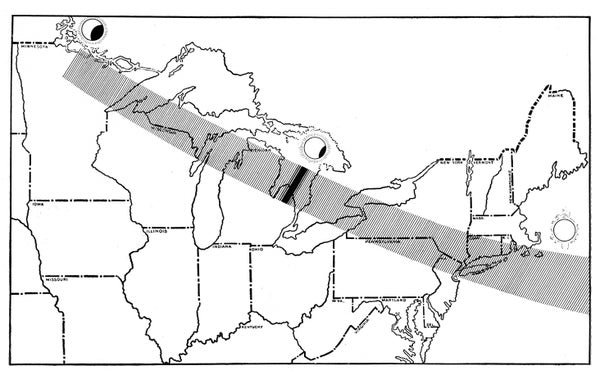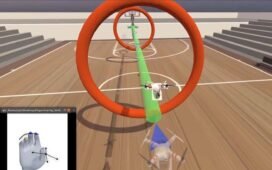October 15, 2024
3 min read
November 2024: Science History from 50, 100 and 150 Years Ago
Computer chess champ; dental chloroform killer

1924, Total Eclipse: “The shaded area marks the ‘shadow path’ in which the total eclipse of the sun, on January 24, 1925, will be visible. At the western end the sun will rise already half eclipsed. At the heavy line midway along the path the eclipse will be just at its beginning as the sun rises. East of this midpoint all the eclipse, from beginning to end, will be visible.”
Scientific American, Vol. 131, No. 5; November 1924
1974
Spatial Relations in Boys and Girls
“A cognitive attribute known as ‘spatial ability’ can be assessed by specially designed tests. Findings that implied a superior male performance have endured in psychology literature. Jerome Kagan, a Harvard University psychologist concerned with child development, and Ann Karnovsky, then one of Kagan’s graduate students, wondered when this supposed superiority first becomes evident. They designed a simple test given to 222 boys and 223 girls in the first, second, third and fourth grades in Lexington, Mass., and the seventh grade in Newton, Mass. The investigators found no sex difference, with one exception: in the low-ability and medium-ability division of the seventh-grade mathematics class, the boys’ performance was significantly superior. Karnovsky and Kagan conclude that males and females are potentially of equal competence. The lower scores of some seventh-grade girls Karnovsky attributes to the effect of cultural conditioning.”
On supporting science journalism
If you’re enjoying this article, consider supporting our award-winning journalism by subscribing. By purchasing a subscription you are helping to ensure the future of impactful stories about the discoveries and ideas shaping our world today.
Computer Chess Champ
“The first world computer chess championship was won in Stockholm by a Russian program called Kaissa, with four victories and no defeats. Three programs each lost one game. The tie was broken based on the fewest total moves and a play-off game. Second place was awarded to the four-time U.S. national champion, Chess 4.0 from Northwestern University. Third place went to Ribbit, the Canadian champion from the University of Waterloo, and fourth place to Chaos, written by programmers at Sperry Univac. There were 13 entries from eight countries.”
1924
Precious Stones Inside Plants
“Now and again, substances which closely resemble opals and pearls are discovered in giant tropical bamboos. In the young stages of growth the hollow stems are filled with a jelly-like substance. As time goes on this dries up and an interesting mineral deposit known as tabasheer is formed. Some of this plays a part in making the stems stiff and strong but, at times, an excess settles in more or less rounded lumps at the stem joints. These are pale blue or white. There is a close chemical connection to an opal, and the general color and the manner of light reflection are much the same.”
A Swinging Apology
“One of our readers, G.H. Taber of Pittsburgh, has been good enough to point out an error which crept into the article on fused quartz in the July issue. On page 59 we said of clocks they run ‘faster as the weather gets warmer and the bob (of the pendulum) longer.’ Of course, the clock runs slower as the pendulum gets longer. We are obliged to Mr. Taber. We are sorry. We will try not to do it again.”
1874
Chloroform Kills Dental Patients
“The death of another patient in the dental chair, while under the influence of chloroform, again attracts public attention. This latest accident occurred in Boston. The jury impaneled at the coroner’s inquest notes that owing to our present lack of knowledge, chloroform’s use as an anaesthetic is utterly unjustifiable. They also recommend legislative enactments to prevent its administration. That does not appear needed, however, since the growing tendency of the medical profession is in favor of pure ether as a substitute, or else a mixture of chloroform, ether and alcohol, which we understand produces good results without causing the dangerous depressing effect of the chloroform or the nausea of ether. The employment of nitrous oxide in dental surgery is also greatly extending; and since it is both a harmless as well as an agreeable anaesthetic, it possesses peculiar advantages.”
Barns Burst into Flame
“Many farmers have experienced sudden and destructive conflagrations in their hay lofts. Barns have been known to burst into flame, almost without warning. Abbé Moigno, in Les Monde, gives the following theory: Hay, when piled damp and in too large masses, ferments and turns dark. In decomposing, sufficient heat is developed and vapors begin to be emitted. The hay becomes carbonized little by little, and then the charred portion, like peat, becomes a kind of pyrophorus. The charcoal becomes concentrated on the surface to such a degree that the mass reaches a temperature which results in its bursting into flames.”









